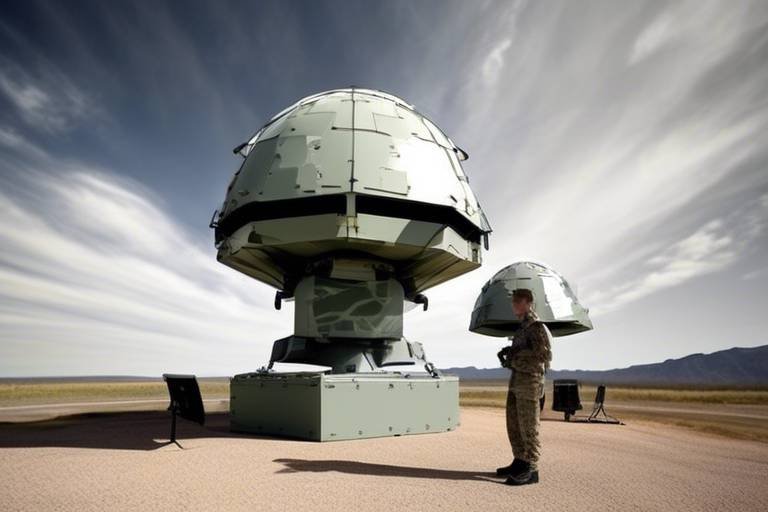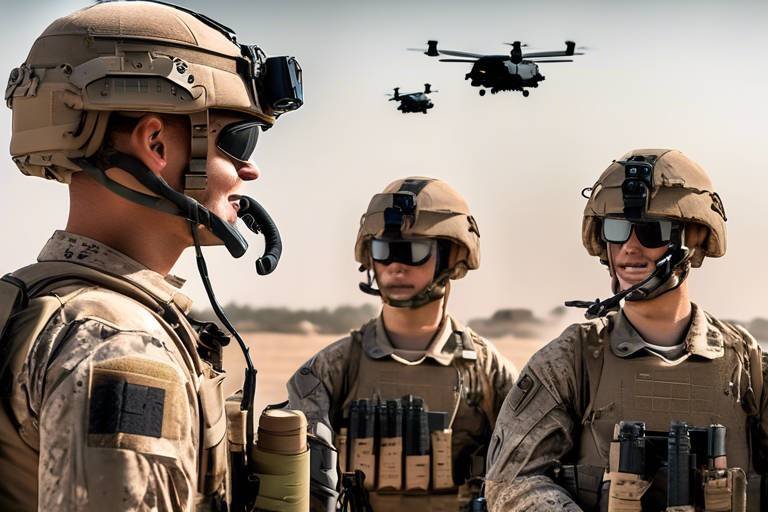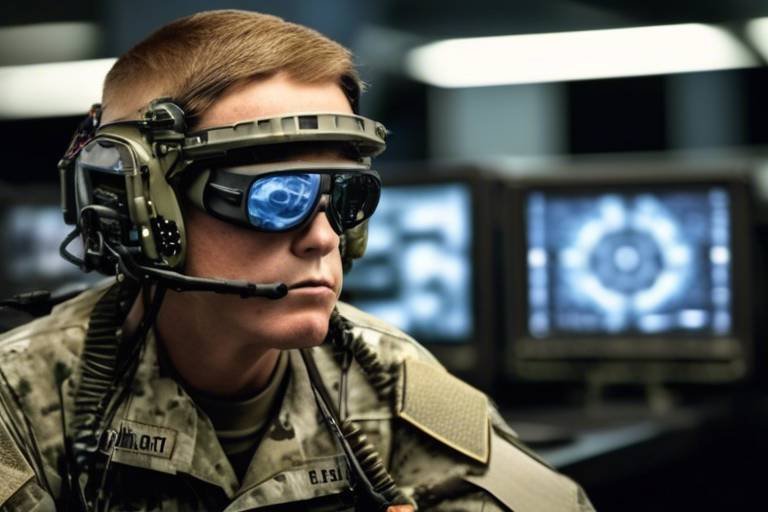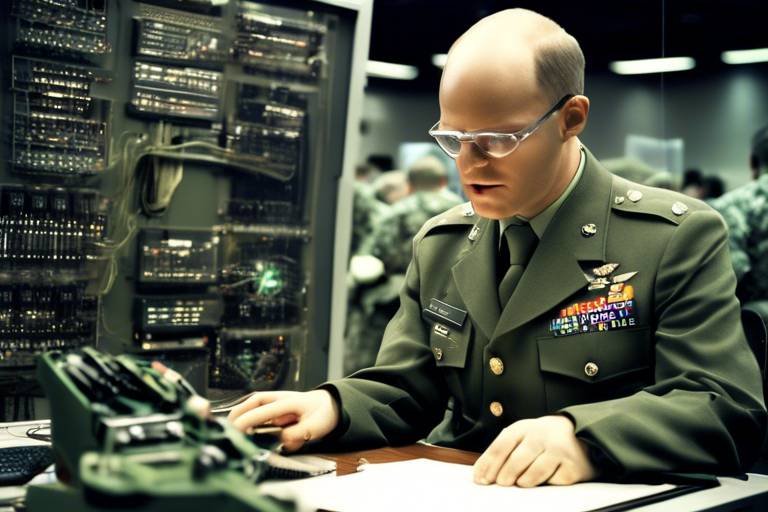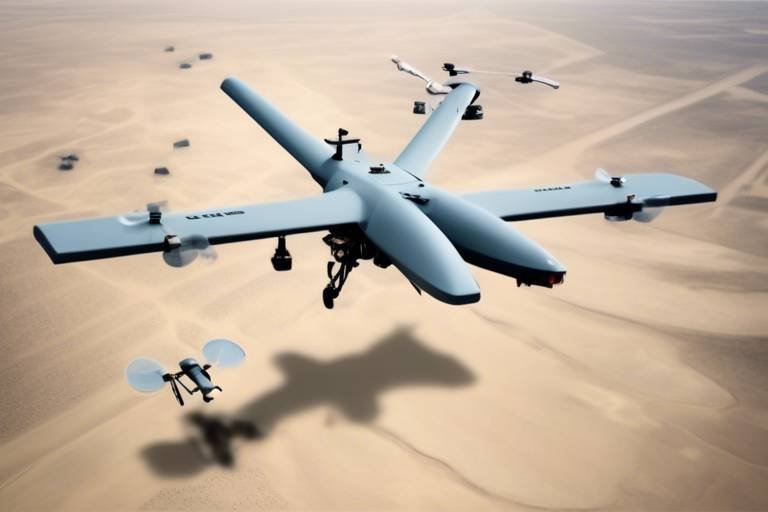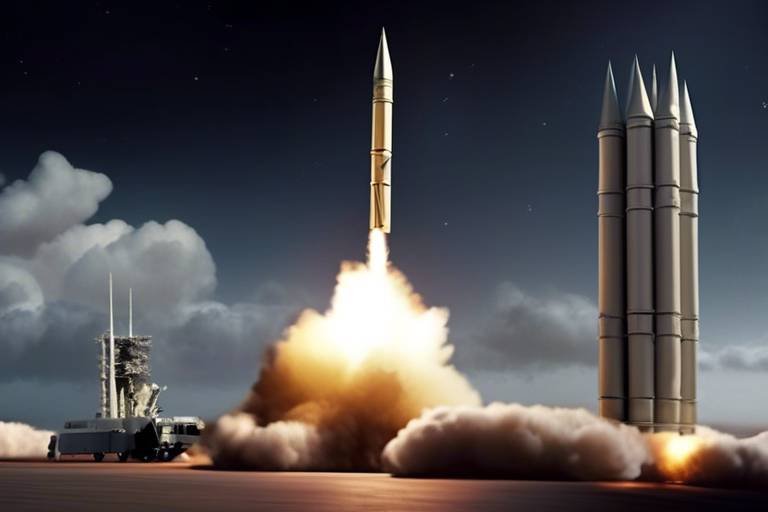Exploring the Role of AI in Military Information Warfare
The digital age has ushered in a new era of conflict, one where information is as potent as any weapon. As we delve into the transformative impact of artificial intelligence (AI) on military information warfare, we uncover a landscape that is rapidly evolving and filled with both opportunities and challenges. Imagine a battlefield where decisions are made in milliseconds, where data flows like water, and where the narratives that shape public perception can be influenced at the push of a button. This is not science fiction; this is the reality of modern warfare. AI is not just a tool; it's a game changer that can redefine how conflicts are fought and won.
In the realm of military operations, the integration of AI is more than just a trend—it's a necessity. As adversaries become more sophisticated, the need for advanced technologies to maintain a strategic edge becomes paramount. From cyber operations to psychological warfare, AI is at the forefront of these efforts, enabling militaries to analyze vast amounts of data, predict enemy movements, and even manipulate information to sway public opinion. The implications of this technology are profound, raising questions about ethics, accountability, and the very nature of warfare itself.
One of the most fascinating aspects of AI in military information warfare is its ability to process and analyze data at an unprecedented scale. Traditional methods of intelligence gathering and analysis simply cannot keep pace with the sheer volume of information available today. AI algorithms sift through mountains of data, identifying patterns and anomalies that human analysts might miss. This capability not only enhances operational efficiency but also informs strategic decision-making, allowing military leaders to respond to threats with agility and precision.
However, with great power comes great responsibility. The use of AI in military contexts raises significant ethical dilemmas. Who is accountable when an AI system makes a mistake? What safeguards are in place to prevent misuse? As we explore these questions, it becomes clear that while AI offers remarkable potential, it also demands a careful examination of its implications for humanity and the future of warfare.
- What is military information warfare? Military information warfare refers to the use of information and communication technologies to gain a strategic advantage over adversaries.
- How is AI used in military operations? AI enhances decision-making processes and operational efficiency by analyzing data, predicting enemy actions, and automating responses to threats.
- What are the ethical concerns surrounding AI in warfare? Ethical concerns include accountability for AI decisions, the potential for misuse of AI technologies, and the implications of autonomous warfare.
- Can AI systems operate independently in military contexts? Yes, AI systems can operate autonomously, but this raises questions about oversight and accountability.

Understanding Information Warfare
In today's fast-paced digital landscape, information warfare has emerged as a critical battlefield, where the fight isn't just for territory but for hearts and minds. So, what exactly is information warfare? At its core, it refers to the strategic use of information and communication technologies to gain an advantage over adversaries. This could mean anything from spreading propaganda to disrupting an opponent's communication systems. The significance of this modern form of warfare cannot be overstated, as it has evolved alongside technological advancements, shaping the way conflicts are fought.
Historically, information warfare has roots that stretch back to ancient times, where misinformation was used as a tactic to demoralize enemies. Fast forward to the present, and we see a sophisticated blend of cyber operations, psychological manipulation, and the use of social media to influence public perception. The rise of the internet and digital communication has transformed the landscape, making information warfare more accessible and pervasive. Countries and organizations can now engage in these tactics with a few clicks, which raises the stakes significantly.
Moreover, the significance of information warfare extends beyond military engagements. It plays a vital role in shaping national security policies and international relations. Governments are increasingly aware that controlling the narrative can lead to favorable outcomes, whether it's rallying support for a war or undermining an adversary's credibility. With the ability to disseminate information rapidly, the battlefield has shifted from physical locations to virtual realms, where perception is often more powerful than reality.
As we delve deeper into the intricacies of information warfare, it's essential to understand its various components. This includes
- Cyber Operations: Engaging in activities that disrupt or manipulate digital networks.
- Psychological Operations: Crafting messages that influence public opinion and morale.
- Propaganda: Spreading biased or misleading information to sway perceptions.
In summary, information warfare is not just a modern phenomenon; it is a transformative force that has redefined how conflicts are approached in the 21st century. As technology continues to evolve, so too will the methods and implications of information warfare, making it an area of ongoing significance for military strategists and policymakers alike.
- What is information warfare? It refers to the strategic use of information and communication technologies to gain an advantage over adversaries.
- How has information warfare evolved? It has evolved from traditional misinformation tactics to sophisticated cyber operations and psychological manipulation.
- Why is information warfare important? It shapes national security policies and influences public perception, making it a critical component of modern conflicts.

The Rise of AI in Military Operations
Artificial Intelligence (AI) is not just a buzzword; it's a game-changer in the military landscape. In recent years, we have witnessed a transformative integration of AI into military strategies, revolutionizing how armed forces operate. Imagine a battlefield where decisions are made in real-time, with the help of intelligent algorithms that analyze vast amounts of data. This is not science fiction; it's the reality of modern military operations.
The development of AI technologies has been nothing short of remarkable. From machine learning to predictive analytics, these advancements enhance decision-making processes, operational efficiency, and situational awareness. For instance, AI can process information from various sources, such as satellite imagery, social media, and reconnaissance reports, allowing military leaders to make informed decisions swiftly. This capability is crucial in high-stakes situations where every second counts.
Moreover, AI is reshaping military training and simulations. With virtual environments powered by AI, soldiers can experience realistic scenarios that prepare them for the complexities of modern warfare. These simulations can adapt in real-time, providing a tailored training experience that enhances readiness. Think of it as a video game that helps soldiers hone their skills, but with much higher stakes.
Cyber operations are increasingly recognized as a critical aspect of information warfare. AI's role in this domain is pivotal, as it allows military organizations to detect, prevent, and respond to cyber threats effectively. The digital battleground is fraught with risks, and AI technologies are at the forefront of safeguarding military networks and sensitive data.
One of the most significant advantages of AI in military cyber operations is its ability to enhance threat detection and response times. Traditional methods of monitoring networks can be slow and often miss subtle signs of intrusion. However, with AI-driven algorithms, military systems can analyze patterns and anomalies at lightning speed. For example, machine learning techniques can identify deviations from normal behavior, triggering alerts before a threat escalates. This proactive approach is akin to having a security guard who doesn't just react but anticipates trouble.
Imagine a scenario where a military network is under cyberattack, and autonomous systems powered by AI can respond instantly without human intervention. This is the promise of automated defense systems. These technologies not only enhance the military's ability to protect its information integrity but also redefine military strategy. By automating responses to cyber threats, armed forces can allocate human resources to more complex decision-making tasks, thereby increasing overall efficiency and effectiveness.
The influence of AI extends beyond the physical and cyber realms; it also permeates psychological operations. In an age where information is power, AI-generated content can be a potent tool for shaping narratives and influencing public perception. By analyzing social media trends and public sentiment, military strategists can craft messages that resonate with target audiences. This manipulation of information can bolster morale or sow discord among adversaries.
As we explore the rise of AI in military operations, it becomes evident that this technology is not merely an enhancement; it is a revolutionary force that is reshaping the future of warfare. The implications are vast, and as AI continues to evolve, so too will its applications in military contexts.
- What is the role of AI in military operations? AI enhances decision-making, operational efficiency, and situational awareness in military contexts.
- How does AI improve cyber operations? AI enables faster threat detection and response, automating defenses against cyber threats.
- What are psychological operations in the military? These operations use AI-generated content to influence public perception and morale.
- Are there ethical concerns regarding AI in warfare? Yes, issues of accountability and potential misuse of AI technologies are significant concerns.

AI-Driven Cyber Operations
In the ever-evolving landscape of military operations, have emerged as a game-changer. Imagine a battlefield not just defined by physical confrontations but also by the digital realm, where the stakes are equally high. The integration of artificial intelligence into cyber operations is revolutionizing how militaries defend against and conduct cyber warfare. AI systems are now capable of analyzing vast amounts of data at lightning speed, identifying threats, and even predicting potential attacks before they happen. This proactive approach is crucial in maintaining the security of military networks and safeguarding sensitive information.
One of the most significant advantages of AI in cyber operations is its ability to enhance threat detection and response. Traditional methods often struggle to keep up with the sheer volume of data generated in real time. However, AI algorithms, powered by machine learning, can sift through this data, learning from patterns and anomalies. This means that when a potential threat arises, AI can flag it for immediate attention, drastically reducing the time it takes to respond. In fact, studies have shown that AI can improve threat detection rates by up to 95%, making it an invaluable tool for military cyber defense.
Furthermore, AI is not just about detection; it's also about automated defense systems. These systems can autonomously react to cyberattacks, mitigating risks without human intervention. Picture a scenario where a cyber intrusion is detected: instead of waiting for a team of analysts to assess the situation, an AI system can immediately initiate countermeasures, isolate affected systems, and even launch counterattacks if necessary. This level of responsiveness is essential in a world where cyber threats can escalate within seconds.
However, the use of AI in cyber operations is not without its challenges. As we rely more on these technologies, we must also consider the implications of their deployment. For instance, the potential for false positives can lead to unnecessary responses, wasting valuable resources and time. Additionally, adversaries are also becoming more sophisticated, leveraging AI to create complex cyber threats that can outsmart traditional defenses. This arms race in the cyber domain raises critical questions about the future of warfare.
| AI Capabilities in Cyber Operations | Impact on Military Strategy |
|---|---|
| Real-time threat detection | Enhanced situational awareness |
| Automated response systems | Faster recovery from attacks |
| Predictive analytics | Proactive threat prevention |
In conclusion, AI-driven cyber operations represent a significant leap forward in military strategy. As we continue to innovate and adapt, the ability to harness the power of artificial intelligence will be pivotal in ensuring military readiness and effectiveness in the digital age. The battlefield of tomorrow will not only be fought with weapons but also with algorithms and data, making it essential for military forces to invest in these technologies to stay ahead of potential threats.
- What is AI-driven cyber operations?
AI-driven cyber operations refer to the use of artificial intelligence technologies to enhance military capabilities in detecting, preventing, and responding to cyber threats. - How does AI improve threat detection?
AI improves threat detection by analyzing vast amounts of data quickly and accurately, identifying patterns and anomalies that may indicate a cyber threat. - What are automated defense systems?
Automated defense systems are AI-powered solutions that can autonomously respond to cyberattacks, initiating countermeasures without human intervention. - What challenges do AI-driven cyber operations face?
Challenges include the risk of false positives, the sophistication of adversarial tactics, and the ethical implications of autonomous decision-making in warfare.

Threat Detection and Response
In the fast-paced world of military operations, the ability to swiftly detect and respond to threats is paramount. With the advent of artificial intelligence (AI), the landscape of threat detection has undergone a remarkable transformation. Imagine a vigilant sentinel, tirelessly monitoring the digital battlefield, capable of identifying anomalies and potential threats almost instantaneously. This is the essence of AI-driven threat detection systems. By leveraging advanced algorithms and machine learning techniques, these systems can analyze vast amounts of data, pinpointing suspicious activities that might elude human operators.
One of the most significant advantages of AI in this realm is its ability to learn from past incidents. Just as a seasoned soldier becomes more adept with experience, AI systems continually refine their detection capabilities by processing historical data and adapting to emerging threat patterns. This means that as cyber threats evolve, so too does the military’s ability to counter them. For instance, AI can identify new malware signatures or unusual network traffic, allowing for proactive measures before a breach occurs.
To illustrate the effectiveness of AI in threat detection, consider the following table that highlights key features of traditional detection methods versus AI-enhanced systems:
| Feature | Traditional Methods | AI-Enhanced Methods |
|---|---|---|
| Speed of Detection | Hours to Days | Seconds to Minutes |
| Data Analysis | Manual Review | Automated Processing |
| Adaptability | Static Rules | Dynamic Learning |
| False Positives | High Rate | Reduced Rate |
This comparison underscores how AI not only enhances the speed and accuracy of threat detection but also significantly reduces the cognitive load on military personnel. By automating the initial phases of threat identification, human operators can focus on strategic decision-making, thus improving overall operational efficiency.
Moreover, the integration of AI in threat response mechanisms ensures that military forces can act decisively in the face of cyberattacks. Automated systems can initiate countermeasures, such as isolating affected networks or deploying defensive protocols, without waiting for human intervention. This rapid response capability is akin to having a fire extinguisher ready to go at the first sign of smoke—essential for minimizing damage and maintaining operational integrity.
However, while AI-driven threat detection and response systems present numerous advantages, they are not without challenges. The reliance on algorithms raises questions about accuracy and bias. If an AI system is trained on flawed data, it may lead to incorrect assessments, potentially causing unnecessary alarms or, worse, overlooking genuine threats. Therefore, continual monitoring and refinement of these systems are crucial to ensure their effectiveness in the ever-evolving landscape of military information warfare.
In conclusion, the role of AI in enhancing threat detection and response capabilities cannot be overstated. As military forces increasingly adopt these technologies, they gain a strategic edge in safeguarding their operations against a myriad of cyber threats. The future of military engagements will undoubtedly be shaped by how effectively these AI systems can adapt, learn, and respond in real-time, ensuring that the digital frontlines remain secure.
- What is AI-driven threat detection? AI-driven threat detection refers to the use of artificial intelligence technologies to identify and respond to potential cyber threats in military operations, enhancing speed and accuracy.
- How does AI improve response times? AI systems can process vast amounts of data and initiate countermeasures autonomously, significantly reducing the time between threat detection and response.
- Are there risks associated with AI in military operations? Yes, potential risks include algorithmic bias and the need for continuous monitoring to ensure accuracy and effectiveness in threat detection.

Automated Defense Systems
In the ever-evolving landscape of military operations, are emerging as a game-changer in the realm of cybersecurity and information warfare. These sophisticated systems leverage the power of artificial intelligence to autonomously detect and respond to cyber threats, thereby revolutionizing how military forces protect their critical infrastructures. Imagine a digital fortress that not only stands guard but also learns from every attack, adapting its defenses in real-time to counteract potential breaches. This is the essence of automated defense systems.
One of the key advantages of these systems is their ability to operate at speeds far beyond human capabilities. In a world where cyberattacks can occur in the blink of an eye, relying solely on human intervention is no longer sufficient. Automated defense systems utilize advanced algorithms and machine learning techniques to analyze vast amounts of data, identifying patterns that may indicate an impending threat. For instance, they can track unusual network activity, flagging it for immediate action before it escalates into a full-blown crisis.
Moreover, these systems can execute pre-defined responses autonomously, minimizing the window of vulnerability. Consider this: if a cyberattack is detected, the system can automatically initiate countermeasures such as isolating affected networks, deploying patches, or even launching counter-offensive strategies without waiting for human approval. This rapid response capability not only enhances the military's defensive posture but also instills a sense of deterrence against potential adversaries.
However, the implementation of automated defense systems is not without its challenges. The reliance on AI for critical decision-making raises questions about accountability and the potential for unintended consequences. For example, what happens if an automated system misinterprets benign activity as a threat? The repercussions could be severe, leading to unnecessary disruptions or even escalation of conflicts. Therefore, establishing robust oversight mechanisms and ensuring that human operators remain in the loop is crucial in mitigating these risks.
In summary, automated defense systems represent a significant stride forward in the military's information warfare strategy. They offer enhanced speed and efficiency in threat detection and response, ultimately fortifying the military's cyber defenses. As these systems continue to evolve, it will be essential for military leaders to balance the benefits of automation with the ethical implications and potential risks associated with their use.
- What are automated defense systems?
Automated defense systems are AI-powered technologies that autonomously detect and respond to cyber threats, enhancing the security of military networks. - How do these systems improve military operations?
They improve military operations by providing rapid threat detection and response capabilities, allowing for quicker mitigation of potential cyberattacks. - What are the risks associated with automated defense systems?
The risks include potential misinterpretation of data leading to false positives, lack of accountability for AI-driven decisions, and the possibility of adversaries exploiting system vulnerabilities. - Can humans override automated decisions?
Yes, it is crucial for human operators to remain involved in the decision-making process to ensure oversight and ethical considerations are addressed.

Psychological Operations and AI
In the complex arena of military information warfare, psychological operations (PSYOP) have emerged as a critical tool for influencing public perception and morale. With the advent of artificial intelligence, the landscape of these operations has transformed dramatically, enabling military strategists to craft narratives that can sway opinions and alter behaviors on a massive scale. Imagine a world where AI algorithms analyze social media trends in real-time, identifying the emotional triggers of different demographics. These insights allow military planners to tailor messages that resonate deeply with targeted audiences, much like a skilled musician knows how to strike the right chord to evoke emotion.
AI-generated content can be utilized to create highly persuasive narratives, leveraging data to predict how certain messages will be received. This capability not only enhances the effectiveness of PSYOP but also raises ethical questions about manipulation and the authenticity of information. For instance, consider the potential for AI to generate deepfake videos or misleading articles that could misinform the public. Such tools could be wielded like a double-edged sword—capable of defending a nation’s interests while simultaneously posing risks of misinformation and erosion of trust in media.
Furthermore, the integration of AI into PSYOP allows for dynamic messaging. Instead of static campaigns that may quickly become irrelevant, AI can adapt messages based on real-time feedback and changing circumstances. This adaptability ensures that military communications remain relevant and impactful, akin to a chameleon that changes its colors to blend into its environment. However, this raises the question of accountability: when AI systems are responsible for crafting and disseminating messages, who is liable for the consequences of those messages?
To illustrate the potential of AI in psychological operations, consider the following table that outlines key applications:
| Application | Description |
|---|---|
| Sentiment Analysis | AI analyzes social media and public forums to gauge public sentiment, allowing for targeted PSYOP campaigns. |
| Content Creation | AI tools generate tailored messages, videos, or graphics designed to influence specific demographics. |
| Behavior Prediction | Machine learning algorithms predict how audiences might react to different messages, optimizing the impact of PSYOP efforts. |
In summary, the role of AI in psychological operations is both revolutionary and fraught with challenges. As militaries around the world continue to explore these technologies, the implications for ethical warfare and public trust cannot be overlooked. The power to shape narratives is immense, but so too is the responsibility that comes with it. As we navigate this new terrain, it is crucial to maintain a dialogue about the ethical boundaries of AI in military contexts, ensuring that the tools designed to protect do not inadvertently harm.
- What are psychological operations in military contexts?
Psychological operations are strategies used by militaries to influence the emotions, motives, and behaviors of target audiences, often through media and communication. - How does AI enhance psychological operations?
AI enhances psychological operations by enabling real-time data analysis, targeted content creation, and adaptive messaging based on audience responses. - What are the ethical concerns surrounding AI in PSYOP?
Ethical concerns include the potential for misinformation, manipulation of public perception, and the lack of accountability for AI-generated content. - Can AI be misused in psychological operations?
Yes, AI can be misused to create deepfakes or spread disinformation, posing risks to public trust and safety.

The Ethical Implications of AI in Warfare
The advent of artificial intelligence (AI) in military operations has opened a Pandora's box of ethical dilemmas that society is only beginning to grapple with. As we integrate AI into the fabric of warfare, questions arise about the morality of autonomous weapons, the accountability of AI-driven decisions, and the potential for misuse of these powerful technologies. What happens when machines are tasked with making life-and-death decisions? This is not just a theoretical question; it’s a pressing concern for military strategists, ethicists, and policymakers alike.
One of the most significant ethical challenges is the issue of accountability. When an AI system makes a decision that results in unintended consequences—be it collateral damage during an airstrike or the misidentification of a target—who is held responsible? Is it the programmer who coded the algorithm, the military officer who deployed the system, or the machine itself? The complexity of tracing accountability in these scenarios can lead to a moral vacuum, where no one feels responsible for the actions taken by autonomous systems.
Moreover, the potential for misuse of AI technologies in warfare adds another layer of ethical concern. Imagine an adversary leveraging AI to create sophisticated misinformation campaigns or automated bots that can manipulate public opinion. The implications of such misuse are staggering. Not only could it undermine democratic processes, but it could also escalate conflicts by spreading false narratives that incite violence or hatred. The ability of AI to generate hyper-realistic fake content can blur the lines between reality and deception, making it increasingly difficult for the public to discern the truth.
In addition, the development of AI-driven autonomous weapons raises profound questions about the moral agency of machines. Can a machine be deemed morally responsible for its actions? If an AI system is programmed to engage in combat, does it have the capacity to understand the ethical implications of its decisions? These questions challenge our traditional notions of warfare, where human judgment has always played a crucial role. The idea of machines making autonomous decisions in combat situations is unsettling and forces us to reconsider what it means to wage war in an ethical manner.
Furthermore, the lack of regulations governing the use of AI in military operations exacerbates these ethical dilemmas. Currently, there is a patchwork of international laws and agreements that do not adequately address the unique challenges posed by AI technologies. The absence of a comprehensive legal framework leaves room for exploitation and raises fears that nations might engage in an arms race to develop increasingly autonomous weapons without sufficient oversight.
To illustrate the ethical landscape surrounding AI in warfare, consider the following table that outlines the key ethical concerns and implications:
| Ethical Concern | Description |
|---|---|
| Accountability | Challenges in attributing responsibility for actions taken by AI systems. |
| Potential for Misuse | Risks of adversaries using AI for misinformation and manipulation. |
| Moral Agency | Questions about whether machines can be held morally accountable. |
| Lack of Regulations | Insufficient legal frameworks to govern the use of AI in military contexts. |
As we continue to advance in AI technology, it is imperative that we engage in a robust dialogue about these ethical implications. Military leaders, ethicists, technologists, and the public must collaborate to establish guidelines that ensure the responsible use of AI in warfare. The future of conflict in the digital age will depend not only on technological superiority but also on our commitment to uphold ethical standards that prioritize human dignity and accountability.
- What are the main ethical concerns regarding AI in military warfare?
The primary concerns include accountability, potential for misuse, moral agency of machines, and lack of regulations. - How does AI affect decision-making in military operations?
AI enhances decision-making by providing data-driven insights, but raises questions about the ethics of autonomous decisions. - What can be done to regulate the use of AI in warfare?
Establishing international agreements and legal frameworks is essential to ensure the responsible use of AI technologies. - Can AI be held accountable for its actions in warfare?
Currently, it is a complex issue, as accountability is often difficult to attribute to machines.

Accountability in AI Decisions
The advent of artificial intelligence in military operations has revolutionized the way conflicts are approached, but it has also raised a myriad of questions about accountability. When autonomous systems make decisions in the heat of battle, who is responsible for the outcomes? Is it the programmer, the military leadership, or the AI itself? These questions are not just academic; they have real-world implications that could shape the future of warfare.
One of the most pressing issues is the challenge of determining accountability when an AI system makes a decision that leads to unintended consequences. For instance, if an AI-controlled drone mistakenly targets civilians instead of enemy combatants, pinpointing responsibility can be incredibly complex. The traditional frameworks of accountability, which often rely on human decision-making, struggle to adapt to a landscape where machines operate with a degree of autonomy.
Moreover, the lack of transparency in AI algorithms further complicates the issue. Many AI systems operate as "black boxes," where the decision-making process is not visible or understandable even to their creators. This opacity raises ethical concerns: how can military personnel justify actions taken by an AI if they themselves do not fully understand its reasoning? In light of this, some experts advocate for the development of more transparent AI systems that allow for better scrutiny and understanding of their decision-making processes.
To address these challenges, several frameworks and guidelines are being proposed. For example, the Department of Defense has initiated discussions around the principles of responsibility, reliability, and explainability in AI systems. These principles aim to ensure that AI technologies are designed and deployed in a manner that maintains human oversight and accountability. However, implementing these guidelines in real-world scenarios remains a daunting task.
Furthermore, the international community is beginning to grapple with these issues as well. The potential for AI to be weaponized raises concerns about compliance with international humanitarian law. Accountability in AI decisions could become a focal point in treaties and agreements aimed at regulating the use of AI in military contexts. As nations strive to navigate this new terrain, the conversation around accountability will be critical in shaping the ethical landscape of future conflicts.
In conclusion, the question of accountability in AI decisions within military contexts is not just a matter of legal responsibility; it's a profound ethical dilemma that challenges our understanding of warfare itself. As we stand on the brink of a new era defined by AI, the need for clear guidelines and frameworks to navigate these issues has never been more urgent. The decisions we make today will echo into the future, influencing not only military strategy but the very fabric of international relations.
- Who is responsible for AI decisions in military operations?
Accountability can be complex, involving programmers, military leaders, and the AI systems themselves. - How can transparency in AI systems improve accountability?
Transparent AI allows for better understanding and scrutiny of decision-making processes, which is crucial for accountability. - What principles are being developed to guide AI use in military contexts?
Principles such as responsibility, reliability, and explainability are being proposed to ensure ethical AI deployment. - How does international law address AI in warfare?
International humanitarian law is beginning to adapt to include considerations about AI accountability and usage in military operations.

Potential for Misuse
The integration of artificial intelligence (AI) into military operations brings with it a plethora of opportunities, but it also opens the floodgates to significant risks, particularly regarding misuse. Imagine a world where the very technologies designed to protect us can be turned against us, manipulated by those with malicious intent. The potential for misuse of AI in military contexts is not just a theoretical concern; it is a real and pressing issue that demands our attention.
One of the most alarming aspects of AI misuse is the prospect of misinformation campaigns. In an age where information is power, the ability to generate and disseminate false narratives can sway public opinion and destabilize nations. AI can create highly convincing fake news articles, videos, and social media posts that can easily mislead the public. This capability can be harnessed by adversaries to undermine trust in government institutions, create social discord, and manipulate electoral processes. The sophistication of AI means that these campaigns can be tailored to target specific demographics, making them even more effective.
Moreover, the use of AI in cyber warfare is another area of concern. Adversaries could deploy AI algorithms to launch sophisticated cyberattacks, exploiting vulnerabilities in military networks. These attacks can range from stealing sensitive information to crippling critical infrastructure. For instance, an AI-driven cyberattack could autonomously identify weaknesses in a military system and exploit them faster than human operators could react. This not only jeopardizes national security but also raises questions about the reliability of AI systems in safeguarding sensitive data.
Furthermore, the potential for autonomous weapons systems to be misused is a hotly debated topic. Imagine a scenario where a drone armed with AI capabilities makes life-and-death decisions without human intervention. The risks associated with such technologies are profound. If an autonomous system misidentifies a target or is hacked, the consequences could be catastrophic. The lack of human oversight raises ethical questions about accountability and the moral implications of allowing machines to make decisions that can lead to loss of life.
To encapsulate the potential risks of AI misuse in military information warfare, consider the following table that summarizes key concerns:
| Area of Concern | Description |
|---|---|
| Misinformation Campaigns | AI-generated fake news and content that can manipulate public perception and destabilize societies. |
| Cyber Warfare | AI algorithms that can autonomously launch cyberattacks, exploiting vulnerabilities in military systems. |
| Autonomous Weapons | Weapons systems that operate without human intervention, raising ethical and accountability issues. |
In conclusion, while AI holds immense potential to revolutionize military operations, it is crucial to remain vigilant about its potential for misuse. As we continue to advance in this field, we must prioritize ethical considerations and implement robust safeguards to prevent adversaries from exploiting these technologies. The balance between leveraging AI for defense and protecting against its misuse is delicate, but it is one that we must navigate carefully.
- What are the risks associated with AI in military operations? The main risks include misinformation campaigns, cyber warfare vulnerabilities, and the ethical implications of autonomous weapons systems.
- How can AI be misused in misinformation campaigns? AI can generate fake news and propaganda that can manipulate public opinion and destabilize societies.
- What are autonomous weapons systems? These are weapons that can operate without human intervention, making decisions on targeting and engagement, which raises ethical concerns.
- What measures can be taken to prevent AI misuse? Implementing strict regulations, enhancing cybersecurity protocols, and ensuring human oversight in military AI applications are crucial steps.
Frequently Asked Questions
- What is information warfare?
Information warfare refers to the strategic use of information and communication technologies to gain an advantage over opponents. It involves tactics that manipulate, disrupt, or control information to influence perceptions and actions in military operations.
- How is AI transforming military operations?
AI is revolutionizing military operations by enhancing decision-making processes, improving operational efficiency, and enabling rapid responses to threats. Its capabilities range from data analysis to automating complex tasks, making military strategies more effective.
- What role does AI play in cyber operations?
AI plays a crucial role in cyber operations by detecting and responding to threats more quickly than human operators could. It uses advanced algorithms and machine learning techniques to identify vulnerabilities and mitigate potential cyberattacks, ensuring the integrity of military networks.
- What are automated defense systems?
Automated defense systems utilize AI to autonomously respond to cyber threats. These systems can analyze incoming data, identify potential attacks, and take preemptive actions to protect military assets, significantly reducing response times.
- How does AI influence psychological operations?
AI influences psychological operations by generating content that can shape narratives and manipulate public perception. It can analyze social media trends and create targeted messaging, thereby impacting morale and the information landscape in warfare.
- What are the ethical implications of using AI in warfare?
The ethical implications of AI in warfare include concerns about autonomous decision-making, accountability, and the risk of misuse. Questions arise about who is responsible for actions taken by AI systems and how to prevent adversaries from exploiting these technologies for malicious purposes.
- How can accountability be established in AI-driven military actions?
Establishing accountability in AI-driven military actions is complex due to the autonomous nature of these systems. It raises challenges in determining who is responsible for decisions made by AI, especially in situations where outcomes are influenced by machine learning algorithms.
- What are the risks of AI misuse in military contexts?
The risks of AI misuse in military contexts include the potential for adversaries to launch misinformation campaigns or engage in cyber warfare. The ability to manipulate information and create believable fake content poses significant threats to national security and public trust.




